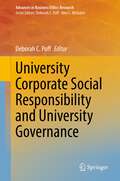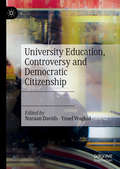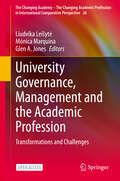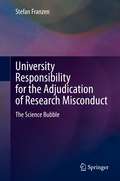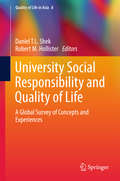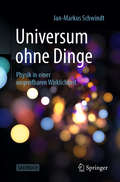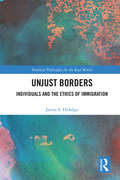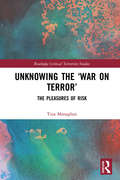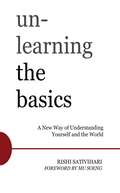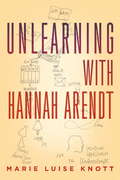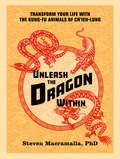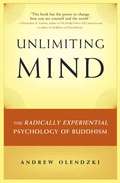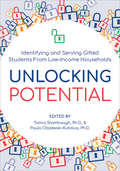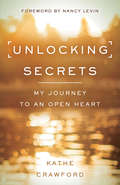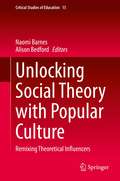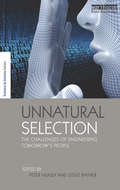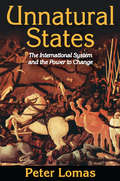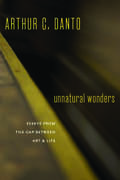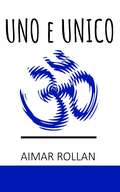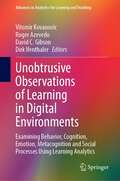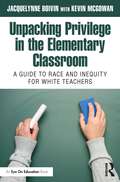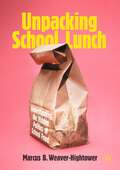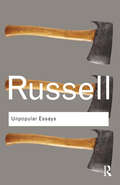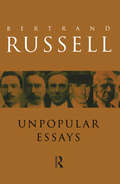- Table View
- List View
University Corporate Social Responsibility and University Governance (Advances in Business Ethics Research #8)
by Deborah C. PoffThis book provides new and original research on the purpose and functions of universities from the perspective of corporate social responsibility. It addresses professional ethics questions that relate to universities as corporate citizens. Divided into two sections, the book starts out with an examination of the concept of universities. It explores the differences between historic and contemporary universities, the history and nature of university governance, the role of higher education, and the problem of domination and subjugation in a management context. The second section looks at the faculty, the students, and the role of spirituality in the university and research. It examines such themes as the nature of faculty and professors, faculty as change agents, diversity, inclusivity and incivility, academic integrity, citizenship of students, and ethical responsibility of researchers. The book calls on the expertise from both the fields of business and professional ethics and university management and leadership. It approaches the subject from an interdisciplinary perspective.
University Education, Controversy and Democratic Citizenship
by Nuraan Davids Yusef WaghidThis book explores the role of the university in upholding democratic values for societal change. The chapters advocate for the moral virtue of democratic patriotism: the editors and contributors argue that universities, as institutions of higher learning, can encourage the creation of critical and patriotic citizens. The book suggests that non-violence, tolerance, and peaceful co-existence ought to manifest through pedagogical university actions on the basis of educators’ desire to cultivate reflectiveness, criticality, and deliberative inquiry in and through their academic programmes. In a way, universities can respond more positively to the violence on our campuses and in society if public and controversial issues were to be addressed through an education for democratic citizenship and human rights.
University Governance, Management and the Academic Profession: Transformations and Challenges (The Changing Academy – The Changing Academic Profession in International Comparative Perspective #26)
by Glen A. Jones Liudvika Leišytė Mónica MarquinaThis volume investigates governance and management of higher education through the lens of the academic profession. Drawing on data from the Academic Profession in the Knowledge-based Society project, an international collaborative research study involving the administration of a common survey to faculty in more than twenty countries, this volume explores important issues of governance and management in relation to, and frequently from the perspective of, the academic profession. It analyzes the complex inter-relationships and intersections between decision processes and structures at both the system and institutional levels and the experiences and perceptions of the academics who play a central role in fulfilling the mission of higher education. Theoretical chapters review key concepts that have grounded the analysis of external (system-level) and internal (institution-level) governance, while the core chapters provide original empirical research, many involving comparative studies, exploring key challenges such as managerialism, gender, shifts in faculty perceptions of influence, and the importance of communication and institutional leadership. Chapter 4,10,11 and 12 of this book are available open access under a CC BY 4.0 license at link.springer.com.
University Responsibility for the Adjudication of Research Misconduct: The Science Bubble
by Stefan FranzenThis book offers a scientific whistleblower’s perspective on current implementation of federal research misconduct regulations. It provides a narrative of general interest that relates current cases of research ethics to philosophical, historical and sociological accounts of fraud in scientific research. The evidence presented suggests that the problems of falsification and fabrication remain as great as ever, but hidden because the current system puts universities in charge of investigations and permits them to use confidentiality regulations to hide the outcomes of investigations. The book documents the significant conflict of interest that arises because federal regulation gives universities the responsibility to conduct investigations of their own faculty with severely limited oversight. The book is intended for young research scientists or anyone who wishes to understand the challenges faced by scientists in the workplace today. The central thread in the book is an exclusive account of an experienced research scientist who was the first to expose the facts that led to the longest running research misconduct investigation in the history of the National Science Foundation.
University Social Responsibility and Quality of Life
by Daniel T. L. Shek Robert M. HollisterThis book provides a critical review of the theory and practice of University Social Responsibility. In addition to addressing the nature of and concepts surrounding University Social Responsibility, as well as its ties to areas such as service learning or engaged scholarship, the book also presents effective practices from around the world. Dedicated chapters demonstrate how University Social Responsibility can manifest itself in different types (civic, moral, economic or global responsibility), levels (local, national, regional or international), and formats (partnership, venture or joint project), depending on local contexts and needs. The book also focuses on three areas of work - educating students to take on social responsibility, broadening access to education, and applying knowledge to societal problems - to highlight the potential and viable ways University Social Responsibility can be employed to promote quality of life in society. Offering a unique resource, it is intended to stimulate thinking and expand the repertoire of all educators, administrators, and organizations who wish to incorporate societal needs into their core mission and promote quality of life in different communities around the world.
Universum ohne Dinge: Physik in einer ungreifbaren Wirklichkeit
by Jan-Markus SchwindtDie Physik ist in der Sprache der Mathematik geschrieben, und ihre Erkenntnisse beruhen auf Tausenden von Experimenten. Doch was für ein Bild zeichnet die Physik von der Welt? Was tragen Theorien wie die Relativitätstheorie oder die Quantenmechanik dazu bei? Wie vollständig ist dieses Bild? Dieses Buch beleuchtet, wie sich die „Dinge“, von denen diese Theorien handeln, zu unseren alltäglichen Dingen verhalten und zeigt auf, welche Fragen noch offen sind und welche Probleme damit einhergehen.Der Autor stellt in diesem Buch dar, wie Physik funktioniert, was sie leisten kann und was nicht. Dabei beschreibt er die überraschenden Antworten, die die Physik auf viele unserer Fragen nach der Natur der "Dinge" und der Welt gibt; Antworten, die unsere Intuition vor so manche Herausforderung stellen.
Unjust Borders: Individuals and the Ethics of Immigration (Political Philosophy for the Real World)
by Javier S. HidalgoStates restrict immigration on a massive scale. Governments fortify their borders with walls and fences, authorize border patrols, imprison migrants in detention centers, and deport large numbers of foreigners. Unjust Borders: Individuals and the Ethics of Immigration argues that immigration restrictions are systematically unjust and examines how individual actors should respond to this injustice. Javier Hidalgo maintains that individuals can rightfully resist immigration restrictions and often have strong moral reasons to subvert these laws. This book makes the case that unauthorized migrants can permissibly evade, deceive, and use defensive force against immigration agents, that smugglers can aid migrants in crossing borders, and that citizens should disobey laws that compel them to harm immigrants. Unjust Borders is a meditation on how individuals should act in the midst of pervasive injustice.
Unknowing the ‘War on Terror’: The Pleasures of Risk (Routledge Critical Terrorism Studies)
by Tina ManaghanThis book offers new insights into the excesses and uncanniness of the ‘War on Terror’ via an engagement with the pleasures of risk. Engaging with the unconscious, the excess, the uncanny and the spectacular dimensions of the ‘War on Terror’ – as made evident, for example, in the 2012 London Olympic Games and the 2013 manhunt for the Boston Marathon bombers – leads this book to probe the so-called order of things that has made this war intelligible in both mainstream and critical approaches to Security Studies and International Relations. Specifically, this book brings to light and theorizes the obscene pleasures of the ‘War on Terror’ and its supplementary precautionary risk logic. Coming to grips with this (i.e., the pleasures of risk), ultimately via an engagement with critical psychoanalytic theory, leads this book to argue that we may be other than we think we are within critical International Relations (IR) traditions. Furthermore, albeit without discounting the madness, if not desolation, of the present (extending from the ‘War on Terror’ to the politics of Brexit and Donald Trump), it suggests there may be some relief in that yet. This book will be of much interest to students of critical terrorism studies, critical security studies, political theory and International Relations broadly.
Unlearning the Basics
by Mu Soeng Rishi SativihariIn fresh and inviting language and making frequent use of strikingly clear diagrams and illustrations, Unlearning the Basics challenges many of our common-sense understandings about ourselves and the world. The author lays out a new way of seeing that enables us to live more serenely, more compassionately, and more free from the slings and arrows of our busy lives. Along the way, Rishi Sativihari looks at love and grasping, at "the great unfixables," and at how vulnerability and pain feed the "evolution of character" -all in the service of helping us return to our true home and find new ways to flourish. Grounded in the Buddhist tradition yet completely free from the formulas of traditional, tired presentations, Unlearning the Basics has an informal, straightforward style that will immediately captivate the reader.
Unlearning with Hannah Arendt
by Marie Luise KnottShort-listed for the Tractatus Essay Prize, an examination of the innovative strategies Arendt used to achieve intellectual freedom After observing the trial of Adolf Eichmann, Hannah Arendt articulated her controversial concept of the "banality of evil," thereby posing one of the most chilling and divisive moral questions of the twentieth century: How can genocidal acts be carried out by non-psychopathic people? By revealing the full complexity of the trial with reasoning that defied prevailing attitudes, Arendt became the object of severe and often slanderous criticism, losing some of her closest friends as well as being labeled a "self-hating Jew." And while her theories have continued to draw innumerable opponents, Arendt's work remains an invaluable resource for those seeking greater insight into the more problematic aspects of human nature. Anchoring its discussion in the themes of translation, forgiveness, dramatization, and even laughter, Unlearning with Hannah Arendt explores the ways in which this iconic political theorist "unlearned" recognized trends and patterns--both philosophical and cultural--to establish a theoretical praxis all her own. Through an analysis of the social context and intellectual influences--Karl Jaspers, Walter Benjamin, and Martin Heidegger--that helped shape Arendt's process, Knott has formed a historically engaged and incisive contribution to Arendt's legacy.
Unleash the Dragon Within: Transform Your Life With the Kung-Fu Animals of Ch'ien-Lung
by Steven MacramallaDiscover your Animal archetype to transform your martial arts practice and improve your physical, emotional, and sexual healthA cognitive psychologist and respected martial art instructor brings to life the Animals of Ch'ien-lung, and how to live the martial art philosophy--on and off the mat! This martial art belongs to everyone, not just for self-defense but as a force for healing. Keen on detail, big in scope, Unleash the Dragon Within shows how to tap into the Cat and Snakeaspects of your mind and body. When you combine the movement, breath and meditation of a Cat with a Snake you create the Dragon, bringing all you are to your athletic performance, spiritual practices and even your sexual relationships.
Unlimiting Mind
by Andrew OlendzkiBoth broad and deep, this eye-opening book is one of the best available overviews of the radical psychological teachings underlying the Buddhist approach to freedom and peace. Sophisticated without being daunting, brilliantly clear without becoming simplistic, Andrew Olendzki's writing is filled with rich phrases, remarkable images, and the fruits of decades of careful thought. Grounded in profound scholarship, psychological sophistication, and many years of teaching and personal practice, this much-anticipated collection of essays will appeal to anyone looking to gain a richer understanding of Buddhism's experiential tools for exploring the inner world. In Unlimiting Mind, Olendzki provokes fresh and familiar reflections on core Buddhist teachings.
Unlocking Potential: Identifying and Serving Gifted Students From Low-Income Households
by Paula Olszewski-Kubilius Tamra StambaughThis edited book, written by authors with extensive experience in working with gifted students from low-income households, focuses on ways to translate the latest research and theory into evidence-supported practices that impact how schools identify and serve these students. Readers will:Learn about evidence-supported identification systems, tools, and strategies for finding students from low-income households.Discover curriculum models, resources, and instructional strategies found effective from projects focused on supporting these students.Understand the important role that intra- and interpersonal skills, ethnicity/race, families, school systems, and communities play.Consider the perceptions of gifted students who grew up in low-income households.Learn how educators can use their experiences to strengthen current services.Unlocking Potential is the go-to resource for an up-to-date overview of best practices in identification, curriculum, instruction, community support, and program design for gifted learners from low-income households.
Unlocking Secrets: My Journey To An Open Heart
by Kathe CrawfordIn this inspiring, soul-searching, and deeply vulnerable memoir, Kathe Crawford lays bare the life of secrets that she kept for many years. When Crawford and her husband, Larry, discovered that Larry was HIV-positive in 1988, they decided to keep the diagnosis a secret from everyone, including their two children. Crawford kept this promise, layering secret upon secret, for almost 30 years, including for more than 20 years after Larry’s death and even as time revealed painful betrayals. Crawford’s journey of unlocking her own secrets, as well as her family’s, was the key to freeing her voice, opening her heart, and finding her true self.
Unlocking Social Theory with Popular Culture: Remixing Theoretical Influencers (Critical Studies of Education #15)
by Naomi Barnes Alison BedfordThis book demonstrates how pop culture examples can be used to demystify complex social theory. It provides tangible, metaphorical examples that shows how it is possible to "do philosophy" rather than subscribe to a theorist by showing that each theorist intersects and overlaps with others. The book is embedded in the literary theory that tapping into background knowledge is a key step in helping people engage with new and difficult texts. It also acknowledges the important role of popular culture in developing comprehension. Using a choose your own adventure structure, this book not only shows students of social theory how various theories can be applied but also reveals the multitude of possible pathways theory provides for comprehending society.
Unnatural Selection: The Challenges of Engineering Tomorrow's People (The Earthscan Science in Society Series)
by Steve Rayner Peter HealeyWith ever-advancing scientific understanding and technological capabilities, humanity stands on the brink of the potential next stage of evolution: evolution engineered by us. Nanotechnology, biotechnology, information technology and cognitive science offer the possibility to enhance human performance, lengthen life-span and reshape our inherited physical, cognitive and emotional identities. But with this promise come huge risks, complex choices and fundamental ethical questions: about evolution; about what it is to be human; and about control over, and the distribution of benefits from, new technology. Written by a range of experts in science, technology, bioethics and social science, Unnatural Selection examines the range of technological innovations offering lives that purport to be longer, stronger, smarter and happier, and asks whether their introduction is likely to lead to more fulfilled individuals and a fairer world. The breadth of approaches and perspectives make important reading for anyone who cares about the implications of humanity engineering its own evolution.
Unnatural States: The International System and the Power to Change
by Peter Ian LomasUnnatural States is a radical critique of international theory, in particular, of the assumption of state agency—that states act in the world in their own right. Peter Lomas argues that since the universal states system is inequitable and rigid, and not all states are democracies anyway, this assumption is unreal, and to adopt it means reinforcing an unjust status quo.Looking at the concepts of state, nation, and agency, Lomas sees populations struggling to find an agreed model of the state, owing to inherited material differences; and unsurprisingly, among theorists of the nation, only controversy and a great confusion of terms. Meanwhile, the functional incarnations of the state agent are caricatures: the mandarin state, the lawyer state, the landlord state, the heir-to-history state, and the patriot state. Yet recent developments in international theory (constructivism, scientific realism, postmodernism) sacrifice state agency only at the price of an unhelpful abstraction.The states system is dysfunctional and obsolete, Lomas contends, and international theory must be recast, with morality as central, to inspire and to guide historic change. He focuses in his conclusion on prescriptions for change, led by four moral concerns: human rights, weapons of mass destruction, relations between rich and poor societies, and the environment."I begin this book," writes Lomas, "with the commonest commonplace of international theory, to expose it as a meaningless cliche. In the masterly hands of Hobbes, it was elaborated into a shock formula for organized society, a reading of history as civilization's failure. Kant sought to rescue morality from Hobbes and create the structures of modernity, but Kant's influence is coming to an end. In the Cold War, politicians disagreeing over another philosopher almost brought the world to an end. Hence the challenges of our time. These are primary and profound. Philosophers have done much to define the modern world. The point of international theory is to change it."
Unnatural Wonders: Essays from the Gap Between Art and Life
by Arthur C. DantoArthur C. Danto's essays not only critique bodies of work but reflect upon art's conceptual evolution as well, drawing for the reader a kind of "philosophical map" indicating how art and the criteria for judging it has changed over the twentieth century. In Unnatural Wonders the renowned critic finds himself at a point when contemporary art has become wholly pluralistic, even chaotic-with one medium as good as another-and when the moment for the "next thing" has already passed. So the theorist goes in search of contemporary art's most exhilarating achievements, work that bridges the gap between art and life, which, he argues, is now the definitive art of our time. Danto considers the work of such young artists as John Currin and Renee Cox and older living masters including Gerhard Richter and Sol LeWitt. He discusses artists of the New York School, like Philip Guston and Joan Mitchell, and international talents, such as the South African William Kentridge. Danto conducts a frank analysis of Matthew Barney's The Cremaster Cycle, Damien Hirst's skeletons and anatomical models, and Barbara Kruger's tchotchke-ready slogans; finds the ghost of Henry James in the work of Barnett Newman; and muses on recent Whitney Biennials and art influenced by 9/11. He argues that aesthetic considerations no longer play a central role in the experience and critique of art. Instead art addresses us in our humanity, as men and women who seek meaning in the "unnatural wonders" of art, a meaning that philosophy and religion are unable to provide.
Uno e Unico
by Valeria Bragante Aimar RollanUno e Unico è un saggio filosofico, una ricerca intellettuale che tenta di dare una risposta alle eterne domande della vita. L’opera consta di circa trenta temi universali, atemporali e che incombono su tutti gli esseri umani, senza considerare età, razza, nazionalità o religione professata. In quest’opera il lettore non troverà grandi affermazioni, né risposte certe. Non troverà dogmi, né dottrine. L’obiettivo di questo libro è far riflettere il lettore, generare in lui un pensiero critico, filosofico, mistico … In definitiva, offrirgli qualcosa che non solo sazi la sua conoscenza, ma che anche gli faccia intraprendere un viaggio interiore per conoscere sé stesso, affinchè trovi, lui stesso, le proprie conclusioni. Quest’opera è il risultato di molti anni di ricerca e riflessione, è una sintesi della conoscenza occidentale(scienza, filosofia, tecnologia …) e della saggezza orientale (yoga, vedanta, meditazione, zen …). "Vivere senza filosofare è, propriamente, avere gli occhi chiusi, senza tentare mai di aprirli". René Descartes.
Unobtrusive Observations of Learning in Digital Environments: Examining Behavior, Cognition, Emotion, Metacognition and Social Processes Using Learning Analytics (Advances in Analytics for Learning and Teaching)
by Roger Azevedo Vitomir Kovanovic David C. Gibson Dirk LfenthalerThis book integrates foundational ideas from psychology, immersive digital learning environments supported by theories and methods of the learning sciences, particularly in pursuit of questions of cognition, behavior and emotion factors in digital learning experiences. New and emerging foundations of theory and analysis based on observation of digital traces are enhanced by data science, particularly machine learning, with extensions to deep learning, natural language processing and artificial intelligence brought into service to better understand higher-order thinking capacities such as self-regulation, collaborative problem-solving and social construction of knowledge. As a result, this edited volume presents a collection of indicators or measurements focusing on learning processes and related behavior, (meta-)cognition, emotion and motivation, as well as social processes. In addition, each section of the book includes an invited commentary from a related field, such as educational psychology, cognitive science, learning science, etc.
Unpacking Privilege in the Elementary Classroom: A Guide to Race and Inequity for White Teachers
by Jacquelynne Boivin Kevin McGowanBrimming with reflection and resources, this book is ideal for white elementary teachers who wish to host conversations about race with their predominantly white classes.This book is a clear-cut guide for integrating antiracism into teaching and education, along with policy reform needed for systemic change. Providing hands-on experience and practical insights from literature, it breaks down subject-specific strategies to approach racial conversations. The book acknowledges the variety of challenges that teachers face and encourages them to continue self-work as a step towards supporting students.While specifically targeting all-white and predominantly white classrooms, this resource is suitable for additional professional development and educator preparation programs when considering a variety of racial dynamics.
Unpacking School Lunch: Understanding the Hidden Politics of School Food
by Marcus B. Weaver-HightowerThis book delves into the heated political battles over what kids eat at school, shedding light onto how policymakers craft food policy for schools. The book takes readers inside schools, through the history of school food programs in the United States and England, and into the policy terrain that makes school lunch difficult to change. Through diverse case studies—hungry linebackers, pink slime, English reality television and policy making, pizza as a vegetable, lunch shaming, and more—chapters provide detailed analysis of rhetorical tactics, arguments over, and policy for school feeding. The book concludes with a progressive vision of school food that is healthy, pleasurable, educative, shame-free, and, most importantly, free for all students, just like the rest of school.
Unpopular Essays
by Bertrand RussellTwelve adventures in argument by the winner of the 1950 Nobel Prize for Literature.
Unpopular Essays
by Bertrand RussellA classic collection of Bertrand Russell’s more controversial works, reaffirming his staunch liberal values, Unpopular Essays is one of Russell’s most characteristic and self-revealing books. Written to "combat… the growth in Dogmatism", on first publication in 1950 it met with critical acclaim and a wide readership and has since become one of his most accessible and popular books.
Unpopular Essays: Fourteen Adventures In Argument By 1950's Nobel Prize Winner (Routledge Classics Ser.)
by Bertrand RussellIn this volume of essays Bertrand Russell is concerned to combat, in one way or another, the growth of dogmatism, whether of the Right or of the Left, which has hitherto characterised our tragic century. This serious purpose inspires them even if, at times, they seem flippant; for those who are solemn and pontifical. In subject they range from Philosophy for the Layman, The Functions of a Teacher, and The Future of Mankind to an Outline of Intellectual Rubbish, Ideas that have helped Mankind and Ideas that have Harmed Mankind.
